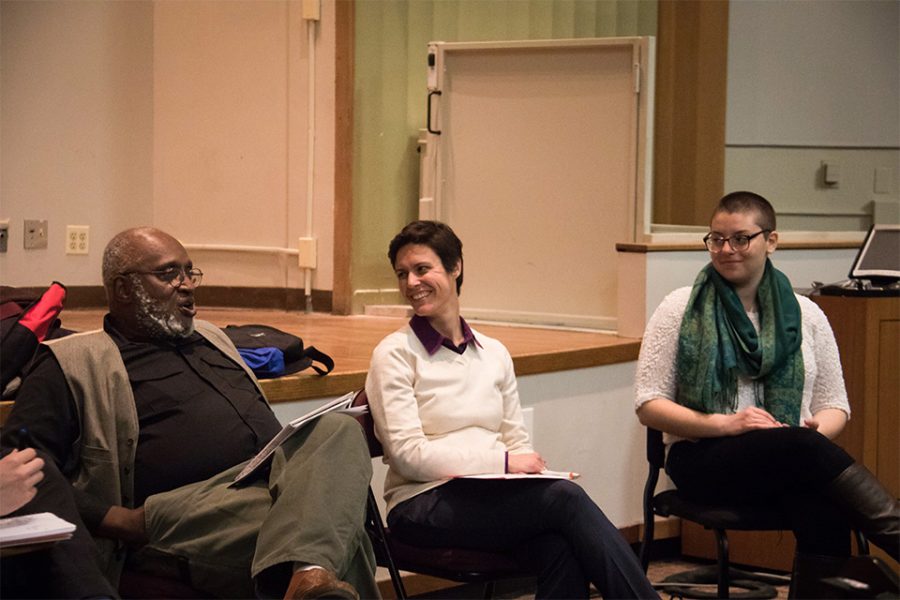Panel discusses balancing activism, academics
Keshia Johnson/The Daily Northwestern
Panelists discuss balancing student activism and academics. The event was hosted by Educate Discuss Unite and focused on the challenges of student activism.
May 11, 2016
It’s nearly impossible to be an activist and have a full-time job, Columbia College Prof. Prexy Nesbitt said at a student activism panel Tuesday night.
“It comes down to what your values are,” Nesbitt said. “Students with a lot of debt have a hell of a choice to make. Do they buckle down and strive to pay off the money or do they begin to challenge the complex institutions and the messy world we live in?”
Nesbitt, along with Associated Student Government president Christina Cilento and Kelly Benkert, director of leadership and community engagement, spoke about how student activists are constantly tested by both academic demands and economic constraints.
About 10 students attended the event in Fisk Hall hosted by Educate Discuss Unite, a student group focused on education policy.
During the discussion, Cilento, a SESP junior, said her main challenge is juggling her academic life with her commitments as an activist for Fossil Free Northwestern.
“It is about figuring out what is important to me,” Cilento said. “Honestly, activism is more important, but I need the grades in order to graduate.”
Nesbitt, who has been a community organizer for 50 years, said he was “thrown out” of the University of Chicago and NU because he couldn’t be an activist while being a full-time student.
The panel also discussed how students should approach activism on campus. Benkert said students should celebrate small wins as much as big ones, even though they can sometimes feel like losses. Student activists must build power and leverage to achieve success in the long run, she added.
Cilento made an example of Fossil Free NU’s campaign to convince NU to divest from fossil fuels. She said the University saying ‘no’ doesn’t mean the conversation is over but that the group must find more weight for its next argument.
Nesbitt also urged patience in approaching resistance to activism.
“You approach with a perspective that, ‘This may take a long time, but I am prepared to fight for a long time.’” Nesbitt said. “You don’t sprint to do community organizing. It is long distance.”
Panelists also said organizing behind student causes can be difficult when most students are only on campus for nine months of the year. However, Nesbitt said community organizing is worth the struggle.
“It’s a messy world out there,” he said. “The older I get the more I realize how complex it is, but how worthwhile it is to be totally engaged in a struggle.”
Educate Discuss Unite’s external programming coordinator Matthew Fulle, a Communication junior, said the event was meant to be a forum for both activists and nonactivists.
Fulle moderated the event and said the panel was intended to include multiple viewpoints, including the administration.
“We wanted to have a discussion about activism as a form of influence and as a way to change the status quo on campus,” Fulle told The Daily. “I want the non-activists walking out the door to be able to talk about activism differently, and I want the activists to be very understanding of some of the challenges that are coming from the other side.”
Email: [email protected]
Twitter: @samkrevlin


